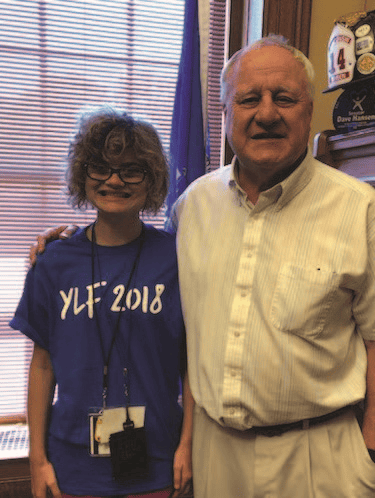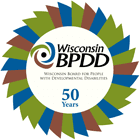Self-Advocate Leadership
and Engagement:
States
Why Self-Advocate Leadership and Engagement is Important to States
Self-advocacy, leadership, and engagement are crucial for individuals with intellectual and developmental disabilities (I/DD) as they promote independence, empowerment, and a better quality of life. By advocating for themselves, individuals with I/DD gain the confidence and skills needed to navigate life independently. Their involvement in leadership roles ensures that services and programs are better tailored to their needs, resulting in more effective support and greater satisfaction. Additionally, their active participation fosters broader community inclusion, breaking down barriers and contributing to a more inclusive society.
For state agencies, prioritizing self-advocacy and leadership among individuals with ID/DD leads to more effective and responsive service delivery. Involving these individuals in decision-making helps agencies design programs that reflect
the community’s needs, ensuring efficient resource use and better outcomes. This approach also fulfills legal and ethical obligations, such as those outlined in the Developmental Disabilities Assistance and Bill of Rights Act (DD Act), which
emphasizes the importance of including individuals with ID/DD in decision-making. Furthermore, promoting inclusion strengthens public trust in government by demonstrating a commitment to upholding the rights and dignity of all citizens.
How States Can Foster Self-Advocate Leadership and Engagement
States can embed practices and principles into their long-term care system that support self-advocate engagement and leadership. By highlighting the role of the individual in designing and directing their services, promoting the voices of those
with lived experiences in decision-making roles including advisory boards, and allowing peer led and peer run organizations the opportunity to provide services, states can grow an empowered community of self-advocates.
Promote Peer to Peer Education
- Encourage providers to partner with self-advocacy organizations to deliver
more trainings - Place a higher value on training opportunities co-created and co-lead by
peers on self-advocacy skills, rights and safety
Provide Peer Mentorship as a Waiver Funded Program
- Create a waiver funded peer mentoring program so that people receiving waiver services have the opportunity to learn skills from someone with lived experience
- Create a process by which self-advocates can become certified peer mentors through a training program
- Have on-going conversations with people with disabilities and providers about the needs that peer mentors can address in their role as certified peer mentors and how they can take their experience as peer mentors to direct and advocate for systems level change.
Promote and strengthen alternatives to guardianship
- If your state does not have a supported decision-making law, look for champions to move a bill forward to establish supported decision-making as a legally allowable alternative to guardianship
- Provide and require guardianship training for potential guardians and ongoing training for guardians
- Provide trainings to families on the limitations of guardianship and the alternatives to guardianship that allow people with disabilities agency over their decision-making
Elevate Self-Advocates in Advisory and Decision-Making Roles
- Embed the principle of “Nothing About Us Without Us” into the practice of the state’s long-term care programs by ensuring that decisions affecting the lives of people with disabilities are being decided with the advice and consent of
people with disabilities - Give self-advocates the opportunity to provide feedback on content and design
- Self-Advocates should not only have a presence but make up a core amount of advisory groups, boards, workgroups, and coalitions where decisions are being made for people with disabilities.
Commit to Plain-language and Easy Read to Better Inform and Engage Self-Advocates
- Materials produced by state agencies and funders that are meant to be consumed by people with disabilities must be in plain-language and in an accessible format so that self-advocates can understand and engage with the information being shared.
- Self-advocates should be involved in the review process for documents and their feedback should be incorporated into all materials.
- Ongoing training on best practices in plain-language and easy read should be available and involve trainers who have
lived experience
Provide Opportunities to Advocate for State Policy Change
- State DD councils should have a Partners in Policymaking Program to train self-advocates on building relationships with policymakers to affect systems level change
- Self-advocates should have opportunities to build skills to communicate and advocate with state-level leaders at departments, agencies, and the legislature
Tools for States
Let’s Talk About Rights Guides and Videos – People with disabilities should be allowed to have and do all the same things as people without disabilities. When people understand their rights, they have better lives. These WI BPDD Living Well guides and videos can help agency staff, guardians and people who receive support learn about rights.
Healthy, Safe and Connected Toolkit– People with disabilities need to be healthy, safe, and connected. This toolkit was developed by the Living Well Project team and self-advocates with People First Wisconsin. This toolkit can be used by states to give people ways they can be healthy, safe, and connected in their communities.
Safe and Free Meetings – The WI BPDD Living Well Safe and Free meetings are designed to help youth and adults with Intellectual and Developmental Disabilities (I/DD) learn about important topics and skills for self-advocacy, safety, and independent living. A self-advocate leader and an agency staff should co-facilitate the meeting series. The topics include – Knowing Yourself, Being Part of Your Community, Rights, Voting, Problem Solving, Communication, Abuse Awareness, Safety at Home and in the Community, and Healthy Relationships. There is a facilitator guide, workbook, and PowerPoint for all twelve meetings in the series.
Peer Mentoring– Several states have implemented peer mentoring in their HCBS Waivers. Optum Health developed a comprehensive peer mentoring training.
Wisconsin Supported Decision-Making Tools– The Wisconsin Board for People with Developmental Disabilities developed multiple resources on supported decision making and alternatives to guardianship. States can use these tools as a guide to develop resources in their state as they promote these options.
SARTAC – View the webinar for Government and Non-profit Agencies on how to create resources in plain language. Slides and recording available.
Partners in Policymaking– 35 states host these advocacy and systems change training programs. The program develops future leaders across the states who are able to work with legislators and communities on policies and initiatives to
support the full inclusion of people with developmental disabilities in all aspects of life.
The Developmental Disabilities State Partners– In every state and territory, programs authorized by the Developmental Disabilities Assistance and Bill of Rights Act (DD Act) empower individuals with developmental disabilities and their families to help shape policies that impact them.
Reflection Activity
Download the Reflection Activity to make your Self-Advocate Leadership and Engagement Action Plan!

Navigate the Blueprint
Use the videos on the Self-Determination Channel where self-advocates can learn skills from their peers:
Real Lives. Real Connections.
“I’ve had the pleasure of knowing Emily for the last almost 16 years and watching her transformation over these last 5 years [of the Living Well Project] has been such a gift for me. I’ve seen someone who is more confident in her voice and is also able to recognize and act on issues and challenges in a new way. She’s learned a whole new skill set to be able to navigate her life and her wants and her needs. I’m also seeing how it is impacting her peers. She understands that her voice has power, and her experiences have power and also influence other people.”
-Living Well Pilot Site

